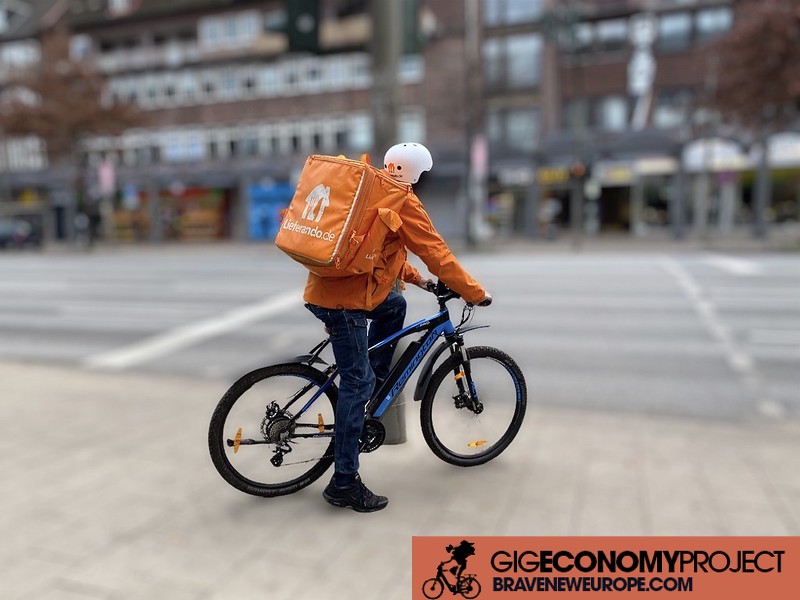Riders and unions complain that the cost of bike purchase and repair takes a significant chunk out of take-home pay.

The Gig Economy Project, led by Ben Wray, was initiated by BRAVE NEW EUROPE enabling us to provide analysis, updates, ideas, and reports from all across Europe on the Gig Economy. If you have information or ideas to share, please contact Ben on GEP@Braveneweurope.com.
This series of articles concerning the Gig Economy in Europe is made possible thanks to the generous support of the Andrew Wainwright Reform Trust.

A Federal Labour Court in Germany has found that an adequate bicycle and smart-phone are necessary work equipment for food delivery couriers, and thus must be provided by the employer.
“Bicycle delivery workers (so-called “riders”) who deliver food and beverages and receive their orders via a smartphone app are entitled to have their employer provide them with the essential work equipment to perform their job,” the Judge found. “This includes a roadworthy bicycle and a suitable internet-enabled mobile phone.”
A courier in the Gewerkschaft NGG union for food and restaurant workers had his case upheld at the Hessian Regional Labour Court in March, but it was appealed by Lieferando, the firm which employs the courier and the largest food delivery company in Germany owned by Dutch multinational Just Eat TakeAway. The case was thus brought to the Federal Labour Court in Erfurt, where the company was defeated again.
The courier receives a repair credit of €0.25 per hour worked, but it can only be redeemed at a company designated by Lieferando. This was all contained within the general terms & conditions of the rider’s contract. Lieferando’s lawyers claimed that the case should be dismissed on the basis that the arrangement was in the contract, and that the fact that he had his own smart-phone and bicycle meant he wasn’t significantly burdened by their use at work, plus he could claim expenses through the repair credits.
The judge rejected Lieferando’s argument, finding the courier was “disadvantaged unreasonably” as he has to “bear the risk of having to answer for wear and tear, depreciation, loss or damage of the essential work equipment.”
“This contradicts the basic legal idea of the employment relationship,” the judge found, “according to which the employer must provide the work equipment essential for the performance of the agreed activity and ensure that it is in good working order. There was no sufficient compensation for this disadvantage.”
The judge also added that Lieferando provided no financial compensation at all for use of the smart-phone, and in any case found that the rider “cannot be referred to downstream claims such as reimbursement of expenses”.
However, the conclusions of the judge do leave some level of ambiguity. The ruling found that it was possible to have a contractual agreement between the rider and the company that the rider uses his own bike and phone, but “if this is done in the employer’s general terms and conditions, they are only effective if the employee is promised appropriate financial compensation for the use of his own bicycle and mobile phone”.
What financial compensation is deemed “appropriate” is unclear, and therefore may define future legal cases in respect to this issue.
“The question will now arise in individual cases as to what reasonable means. One would have wished for more clarity on this,” labour lawyer Michael Fuhlrott told Der Spiegel.
Nonetheless, the Erfurt court ruling is a significant victory for riders and unions who have long argued that the burden of bike purchase and repair, and to a lesser extent mobile phone usage, is a significant cost which reduces their take-home pay substantially.
Just Eat Takeaway is one of the largest food delivery company’s in Europe and began hiring all of its riders as employees last year, either directly or through sub-contractors. Any shift of policy towards providing bikes and phones for riders across the continent would therefore have an impact on tens of thousands of riders. Lieferando did not issue a statement after the Erfurt court defeat.
To sign up to the Gig Economy Project’s weekly newsletter, which provides up-to-date analysis and reports on everything that’s happening in the gig economy in Europe, leave your email here.
BRAVE NEW EUROPE has begun its Fundraising Campaign 2021
Support us and become part of a media that takes responsibility for society
BRAVE NEW EUROPE is a not-for-profit educational platform for economics, politics, and climate change that brings authors at the cutting edge of progressive thought together with activists and others with articles like this. If you would like to support our work and want to see more writing free of state or corporate media bias and free of charge. To maintain the impetus and impartiality we need fresh funds every month. Three hundred donors, giving £5 or 5 euros a month would bring us close to £1,500 monthly, which is enough to keep us ticking over. Please donate here.


Be the first to comment